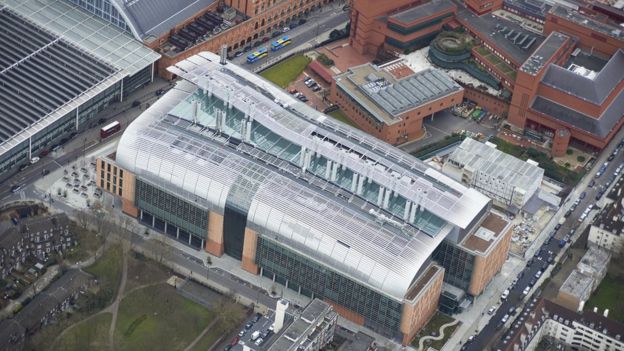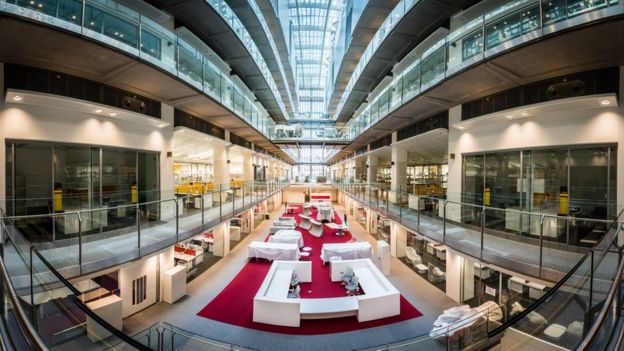The Francis Crick Institute: Home
https://www.crick.ac.uk/
The Francis Crick Institute is an interdisciplinary medical research institute due to open in 2015.
The Crick: Europe's biggest biomedical lab opens
Europe's biggest biomedical laboratory, the Francis Crick Institute, has opened in London.
BBC News - 16 hours ago
The Crick: Europe's biggest biomedical lab opens
- 1 September 2016
- Health
Europe's biggest biomedical laboratory, the Francis Crick Institute, has opened in London.
The £650m building, behind St Pancras station and the British Library, will be home to 1,250 scientists.
Named after the co-discoverer of DNA structure, the Crick will examine fundamental questions about how illnesses develop, in order to find new ways to treat conditions such as cancer, heart disease, stroke, infections and diseases of the brain.
The director of the institute, Sir Paul Nurse, said the Crick would "attract brilliant, bold and creative scientists from the UK and around the world".
 CRICK
CRICK
Sir Paul, a Nobel Prize winner and former president of the Royal Society, is among the first scientists to move into the building.
He and his team are studying cell division, which is crucial to understanding how cancer and other diseases develop.
Sir Paul said the UK's decision to leave the EU meant the Crick would lose a planned £10m a year in EU funding, which would need to be replaced by government funding.
However, he said, Britain was a "great scientific nation" and the Crick would be a symbol the UK was "open for business".
 CRICK
CRICK
The Crick is funded mainly by the Medical Research Council, Cancer Research UK and the Wellcome Trust.
The building will replace ageing and cramped laboratories at Mill Hill in north London, Lincoln's Inn Fields, and Potters Bar, Hertfordshire.
Although the main focus of the Crick will be the biological processes underlying human health and disease, it will also do "translational research", which aims to turn lab discoveries into treatments for patients.
The institute has a partnership with pharmaceutical giant GlaxoSmithKline.
Facts about the Crick:
- total floor space of 93,000 sq m (23 acres), more than 17 football pitches
- eight floors above ground and four below
- basement floors house electron microscopes and magnetic resonance scanners
- vibration resistant so sensitive equipment in the basement is unaffected by underground trains and traffic
- the basement has a large animal research facility
- annual budget of about £130m
(中央社記者黃貞貞倫敦2日專電)造價6億5000萬英鎊,號稱歐洲規模最大的生物醫學研究中心今天正式在倫敦開幕,未來將專注在治療癌症、心臟疾病、中風及與腦部相關的疾病研究。
這個先進的生化研究中心位在聖潘克拉斯車站(StPancras)附近,以共同發現DNA結構的科學家克利克(Francis Crick)為名,共有12個樓層,全部面積達9萬3000平方公尺,超過17個足球場,為確保敏感的實驗器材不受影響,位在地下室的樓層都做了防震處理,未來將有1250名科學家在這裡工作。
研究中心執行長納斯(Paul Nurse)2001年獲得諾貝爾醫學獎,他與研究團隊研究細胞分裂,藉此了解癌症及其它疾病的發展。他說,英國是一個偉大的科學研究國家,新的研究中心將能吸引英國與世界各地頂尖並有創意的科學家。
Francis Crick研究中心每年有1億3000萬英鎊的經費,主要來自醫學研究協會,英國癌症研究及維康信託基金會(Wellcome Trust),合作的廠是葛蘭素史克藥廠(GlaxoSmithKline)。
納斯表示,6月底英公投決定脫歐後,將使研究中心喪失每年1000萬英鎊來自歐盟的經費,這個缺口必須以政府的經費來補足。1050902
這個先進的生化研究中心位在聖潘克拉斯車站(StPancras)附近,以共同發現DNA結構的科學家克利克(Francis Crick)為名,共有12個樓層,全部面積達9萬3000平方公尺,超過17個足球場,為確保敏感的實驗器材不受影響,位在地下室的樓層都做了防震處理,未來將有1250名科學家在這裡工作。
研究中心執行長納斯(Paul Nurse)2001年獲得諾貝爾醫學獎,他與研究團隊研究細胞分裂,藉此了解癌症及其它疾病的發展。他說,英國是一個偉大的科學研究國家,新的研究中心將能吸引英國與世界各地頂尖並有創意的科學家。
Francis Crick研究中心每年有1億3000萬英鎊的經費,主要來自醫學研究協會,英國癌症研究及維康信託基金會(Wellcome Trust),合作的廠是葛蘭素史克藥廠(GlaxoSmithKline)。
納斯表示,6月底英公投決定脫歐後,將使研究中心喪失每年1000萬英鎊來自歐盟的經費,這個缺口必須以政府的經費來補足。1050902

沒有留言:
張貼留言